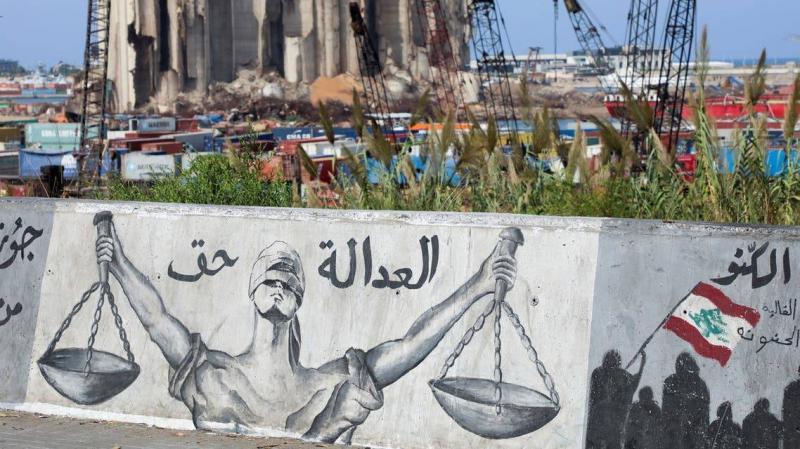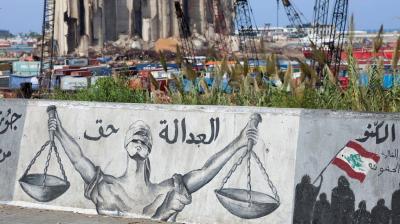Under the title "The Ongoing Battle Between Hezbollah and the Beirut Blast Judge: What is the Fate of Beitar?", Al Arabiya reported that Hezbollah has not been satisfied with the threats made by its liaison and coordination unit head, Wafiq Safa, to remove the investigative judge in the Beirut Port explosion, Judge Tarek Beitar, accusing him of being "politicized and selectively acting" according to the words of its leader Hassan Nasrallah. Instead, it has escalated further, placing Lebanon in a scenario of "security and stability or removing the judge from the investigations."
### Judicial Uprising
However, it seems that dismissing Judge Tarek Beitar is not a simple task, especially as he faces what resembles a "judicial uprising," in which the Court of Cassation has played a crucial role by rejecting three motions for disqualification submitted by ministers (allied with Hezbollah) who are defendants in the port explosion case of August 4, which resulted in more than 210 casualties and thousands of injuries.
### Hezbollah's Main Battle
Former Lebanese Ambassador Hicham Hamdan told Al Arabiya that Hezbollah considers Judge Tarek Beitar its main battle, emphasizing that it cannot back down from fighting this battle. He noted that if Beitar is not removed, it would signify a failure for Hezbollah, which would be a significant blow to them. Additionally, Hamdan confirmed that this issue has transcended into a political matter, with Hezbollah and its allies viewing it as a front that holds them responsible for the events at the Beirut Port.
### Self-Incrimination
He also pointed out that the Shiite duo, Hezbollah and "Amal Movement," has already self-incriminated themselves regarding the events in Tayouneh. He views that true justice will only be achieved by calling for an international investigation. Hamdan stated, "If Hezbollah succeeds in its battle against Tarek Beitar, the biggest loser among Christians will be its ally, the Free Patriotic Movement. Therefore, the least painful option for the movement would be to break its alliance with Hezbollah."
### Political Fireball
Recently, the government has been the stage for a political struggle surrounding the investigative judge, with ministers from the Shiite duo and their ally, "The Marada Movement," threatening to withdraw from it unless a solution is found for Beitar and he is prevented from continuing his investigations. This aligns with Nasrallah's demands that the Cabinet and the Higher Judicial Council address the issue of the judge, whom he claims is operating with a political agenda.
The motion for legitimate suspicion filed by former Minister of Public Works and Transport Youssef Fenianos before the Court of Cassation awaits a decision. This motion was responsible for the downfall of former judge Fadi Sawwan in February, appointed by the defendant Minister Ghazi Zaiter. Although experts assert that the government lacks legal options since it is not the competent authority in judicial matters based on the principle of separation of powers, the pressure exerted by Hezbollah could push it to grasp the political fireball and attempt to find a solution.
### Political Exit
In this context, former President of the Constitutional Council Judge Issam Suleiman clarified to Al Arabiya that throwing the ball back to the Cabinet indicates a search for a "political" solution rather than a legal one, meaning putting an end to the pursuit of justice regarding the Beirut Port explosion and circumventing the investigations. He emphasized that "Judge Tarek Beitar was not appointed through a decree issued by the Cabinet but by a decision from the then-Minister of Justice, Marie Claude Najm, making it outside the Cabinet’s authority to dismiss him."
### Harsh Interference
However, he expressed regret that "the path being taken in the Beirut Port explosion case veers towards a political direction, and thus, the exit will be through politics, which constitutes blatant interference in the work of the judiciary." Should the government distance itself from the case to avoid detonating it with the port investigation, the choice would then fall upon the Higher Judicial Council, which Hezbollah’s Secretary-General has placed in charge of "finding a solution for the investigative judge."
With the assembly of the Higher Judicial Council, headed by Judge Suhail Aboud, replacing Judge Beitar requires an ordinary majority (i.e., 5 out of 8 votes) in agreement with the Minister of Justice. However, this option is deemed unlikely by judicial sources, as "the council supports the work of the investigative judge." Sources also noted that a legal exit might be found through the Parliament by referring the case to the Higher Council for the Trial of Presidents and Ministers, indicating a "positive jurisdictional conflict" with two courts considering themselves competent for the same file.
### Government's Fate
Returning to the government and its fate, sources close to the presidential palace informed Al Arabiya that the Minister of Justice, who met with President Michel Aoun yesterday, in coordination with the investigative judge, is addressing the issue through the Higher Judicial Council now that appointments in it are complete, being the natural venue to address what has happened under the principle of separation of powers. The sources pointed out that "the Cabinet cannot make a decision against the investigative judge based on the principle of separation of powers, thus the issue is being dealt with through the concerned body for judges." They clarified that “presidents Michel Aoun and Najib Mikati will not issue a call for a Cabinet session at this time, allowing judicial remedies to take their course."




